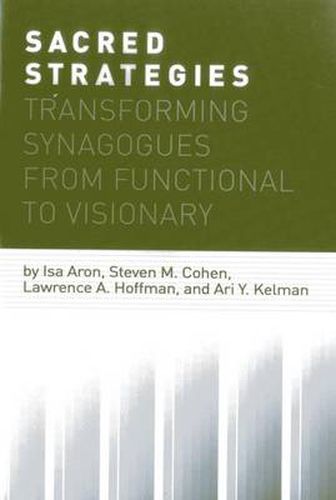Readings Newsletter
Become a Readings Member to make your shopping experience even easier.
Sign in or sign up for free!
You’re not far away from qualifying for FREE standard shipping within Australia
You’ve qualified for FREE standard shipping within Australia
The cart is loading…






Sacred Strategies is about eight synagogues that reached out and helped people connect to Jewish life in a new way-congregations that had gone from commonplace to extraordinary. Over a period of two years, researchers Aron, Cohen, Hoffman, and Kelman interviewed 175 synagogue leaders and a selection of congregants (ranging from intensely committed to largely inactive). They found these congregations shared six traits: sacred purpose, holistic ethos, participatory culture, meaningful engagement, innovation disposition, and reflective leadership and governance. They write for synagogue leaders eager to transform their congregations, federations and foundations interested in encouraging and supporting this transformation, and researchers in congregational studies who will want to explore further. Part 1 of this book demonstrates how these characteristics are exemplified in the four central aspects of synagogue life: worship, learning, community building, and social justice. Part 2 explores questions such as: What enabled some congregations to become visionary? What hindered others from doing so? What advice might we give to congregational, federation, and foundation leaders? The picture that emerges in this book is one of congregations that were entrepreneurial, experimental, and committed to ‘something better.
$9.00 standard shipping within Australia
FREE standard shipping within Australia for orders over $100.00
Express & International shipping calculated at checkout
Sacred Strategies is about eight synagogues that reached out and helped people connect to Jewish life in a new way-congregations that had gone from commonplace to extraordinary. Over a period of two years, researchers Aron, Cohen, Hoffman, and Kelman interviewed 175 synagogue leaders and a selection of congregants (ranging from intensely committed to largely inactive). They found these congregations shared six traits: sacred purpose, holistic ethos, participatory culture, meaningful engagement, innovation disposition, and reflective leadership and governance. They write for synagogue leaders eager to transform their congregations, federations and foundations interested in encouraging and supporting this transformation, and researchers in congregational studies who will want to explore further. Part 1 of this book demonstrates how these characteristics are exemplified in the four central aspects of synagogue life: worship, learning, community building, and social justice. Part 2 explores questions such as: What enabled some congregations to become visionary? What hindered others from doing so? What advice might we give to congregational, federation, and foundation leaders? The picture that emerges in this book is one of congregations that were entrepreneurial, experimental, and committed to ‘something better.